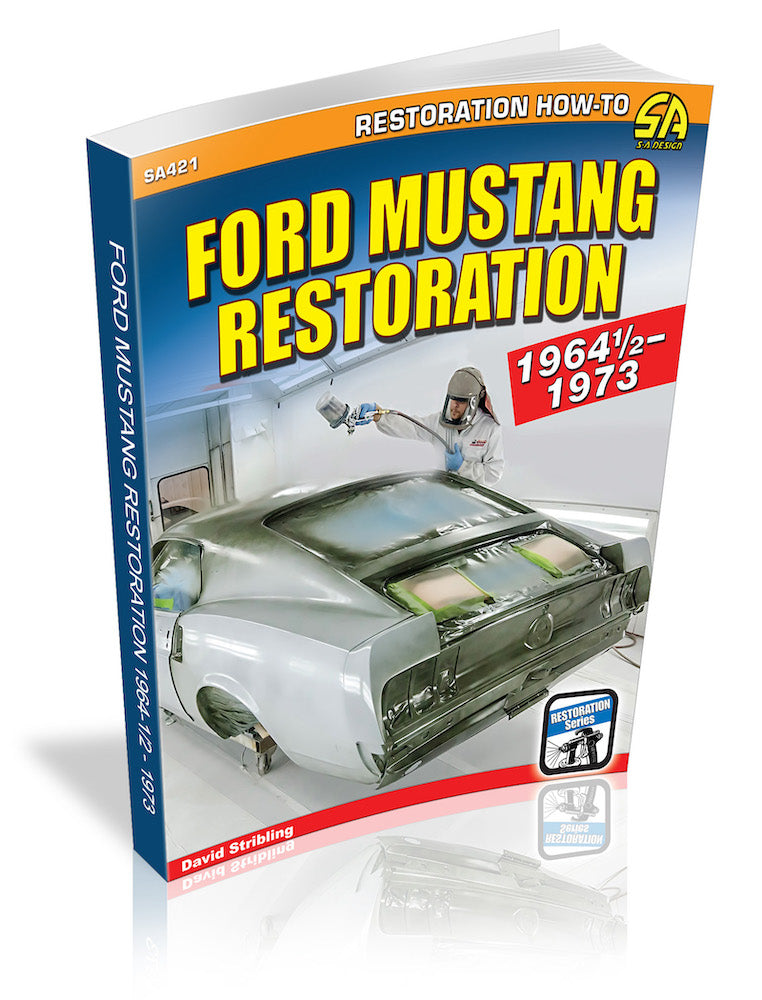
Get valuable advice on how to restore your vintage Mustang!
Production of the Ford Mustang, America’s most popular pony car, has been uninterrupted for more than 55 years. The popularity of the Mustang is what led to the pony-car class. The first generation of cars, from 1964-1/2 to 1973, is arguably the most beloved generation, selling more than a million cars in the first two years of production. They were sporty, affordable, and available with a wide variety of options to please a wide variety of customers.
First-generation Mustangs are still very popular. They are plentiful and can be found at various price points and in various levels of condition for any potential restorer to acquire. There is an extremely robust aftermarket, so parts availability is never an issue.
Mustang expert and author Dave Stribling shares his expertise in this restorer’s guide, covering all of the essential topics. The basics of acquiring a car, determining the restoration level that is desired, and the tools necessary for the job are included. Disassembly, prep for paint and body and reassembly are covered. Also, the suspension and braking systems, the engine and driveline, and the electrical and interior components are examined.
This book is an ideal starting point that features a lot of great advice about how to achieve what you want from your restoration and the best path to get there. Whether you want to tackle all of the work yourself or you just want to be informed when hiring a professional to do the work for you, this book is a valuable addition to your Mustang library.
Pages : 176
Size : 8.5 X 11 (inches)
Format : Paperback / softback
Illustrations : 536 color photos and charts
Publisher : CarTech
ISBN : 9781613254165
Product Code : SA421
Acknowledgments
Introduction
Chapter 1: The Basics
Rule 1: Know What You Have
Rule 2: Buying a Restored Car is Usually Cheaper than Restoring One
Rule 3: Double the Budget
Rule 4: Ford Parts Fit Better
Rule 5: Know Your Capabilities
Rule 6: A Disassembled Mustang Takes up a Lot of Space
Rule 7: Restore the Body Correctly
Rule 8: Do It Right the First Time
Rule 9: Understand the Final Objective
Rule 10: Organize and Document
Shelbys, Bosses, and Other Limited Editions
Modified Cars
Engines
Transmissions
Safety Issues
Chapter 2: Planning and Evaluation
Restoration Levels
Judging Standards
Restoration Candidates
Rebodies
Car Selection
Selecting a Professional
Skill Set Evaluation
Tools and Equipment
Ford Parts Identification
Ford Parts Numbering System
Reference Books
Chapter 3: Disassembly and Storage
Work Area and Parts Storage
Documentation
Paintless Dent Repair
Panel Alignment
Disassembly
Rotisseries
Helpful Brackets
Chapter 4: Body Preparation and Bodywork
Preparation and Evaluation
Media Blasting
Panel Alignment
Rust, Pinholes, and Dents
Previous Repairs
Repair Techniques
Panel Repair
Battery Tray Repair
Apron Spot Welds
Floor Pan Repair
Grinding and Sanding
Hinge Repair
Fiberglass Repair
Rust-Preventative Paint
Recheck Alignment
Chapter 5: Paint
Home Paint Booth
Ford Painting Sequence
Proper Color Myth
Paint Runs and Orange Peel
Paint Types
Supplies
Priming
Sound Deadeners and Sealants
Masking
Painting
Chapter 6: Engine
Engine History
Machine Shop
Engine Considerations
Engine Painting
Carburetors
Distributors and Alternators
Exhaust Manifolds
Front Pulleys and Accessories
Emissions-Control Systems
Chapter 7: Transmission and Drivetrain
Automatic Transmissions
Manual Transmissions
Crossmember
Driveshaft
U-Joints
Yoke117
Chapter 8: Suspension and Steering
Front Suspension
Steering
Power Steering
Chapter 9: Brakes and Rear Axle
Drum Brakes
Disc Brakes
Master Cylinder
Power Brake Booster
Emergency Brake
Rear Suspension
Rear Axle
Chapter 10: Electrical
Grounds
Starting System
Wiring Harnesses
Fuse Block
Gauges
Ignition Switch
Turn-Signal Switch
Charging System
Voltage Regulator
Horns
Lighting
Radio
Chapter 11: Interior
Dash Pad
Carpet
Headliner and Convertible Tops
Seat Re-Covering
Door Panels
Interior Side Panels
Instrument Housing
Heater Box
Chapter 12: Reassembly and Completion
Soft Weatherstripping
Strip Caulk
Door Beltline Weatherstripping
Radiator Support Seal
Glass Alignment
Chrome and Brightwork
Engine Start-Up
Engine Break-In
Transmission Break-In
Tires
Alignment
Insurance
Source Guide
Customer Reviews
Based on 1 review
Write a review

